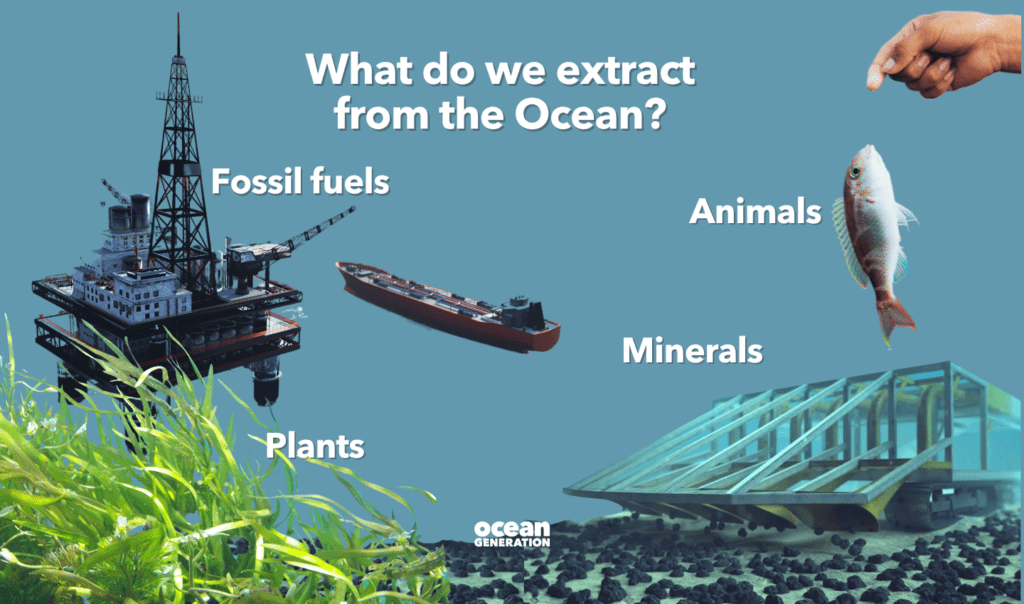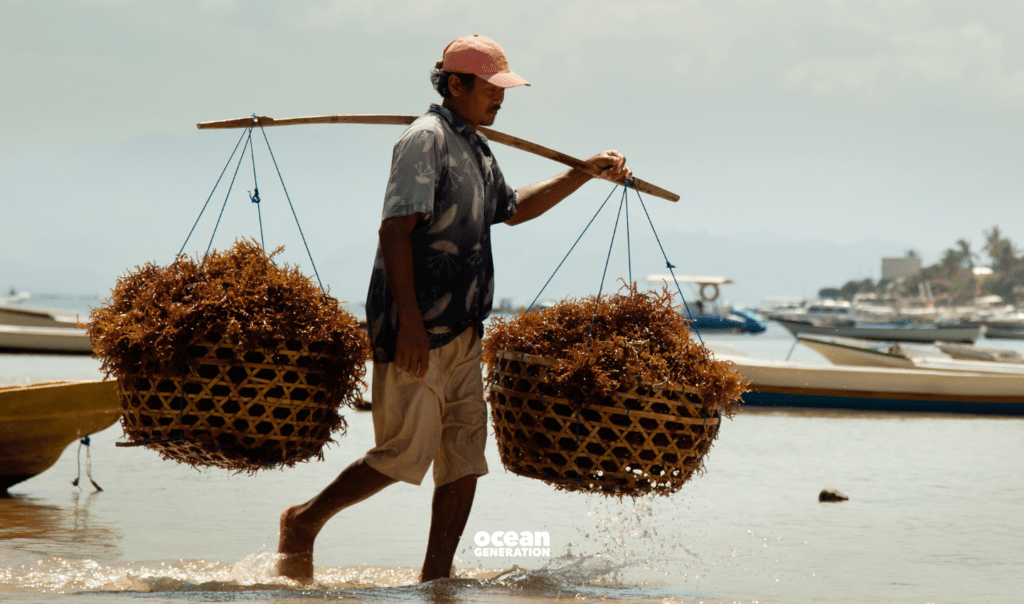- Our Impact: Threats
- Science: Explained
Our Impact: What resources do we extract from the Ocean?

This is part of our Four Pillars work that highlights the importance of the Ocean, the human-made threats it faces, and the solutions our Ocean provides.
Humans have been travelling across the Ocean for many millennia, with fishing being an important ancient practice.
Along with capturing food from the sea, we slowly recognised the Ocean as a valuable source for much more.

What are the impacts of extracting seafood from the Ocean?
Fast forward to present day, we now eat almost twice as much seafood, compared to 50 years ago.
Offshore oil extraction has not been kind to marine life, with disruptions in the form of noise pollution, habitat destruction, and oil spills. And the Ocean is being glorified as a new frontier for mineral extraction from the seabed.
We’ve benefitted from a great deal of things we’ve extracted from the Ocean. But do we ever give back and allow the Ocean to replenish?
Do we assess the risks before we extract? Let’s take a closer look into some of the resources we want and how removing them impacts our Ocean.

How much do humans rely on the Ocean for food?
Animal protein from the Ocean provides around 17% of all animal protein consumed. The food we obtain from the Ocean and other water bodies are inextricably linked to many cultural identities.
From national dishes (Example: Senegal (Ceebu jën)) to fishing traditions (Example: in Finland), many coastal communities around the world uphold seafood as a pillar of cultural identity, livelihoods, food security, tradition and connection to the Ocean.

Global seafood production is on the rise
With global production of seafood quadrupling over the last 50 years, it is no surprise that wild catching has become unsustainable and cannot keep up with global demand.
Enter, aquaculture: A process where seafood is farmed, by corporations and farmers alike. There are many variations of aquaculture, depending on the location and type of organism being cultivated.
Is aquaculture the sustainable solution we’ve been looking for?
This booming method overtook seafood production from conventional fisheries by 12.26 million tonnes in 2015. It is important to note that aquaculture includes aquatic plants like seaweed as well.

Aquaculture has been touted for its high yields and added nutritional value, but sustainable production requires:
– careful consideration of the surrounding environment, so as to not burden wild species and damage coastal blue carbon ecosystems,
– sustainable supply of aquafeed, i.e., food for the cultured organisms, and
– adequate disease control among the cultivated populations.
Aquaculture supports the livelihood of over 540 million people (in 2014) with 19% being women.
To ensure a stable income and a stable Ocean, there is a need for better guidelines for operational safety and management to ensure healthy fish stocks.
However, food from the Ocean isn’t the only thing we extract…
What resources do we extract from the Ocean?
Drill baby, drill
From the dawn of time, humans have sparked revolutionary leaps through different forms of energy.
Although fire was a major leap in evolutionary standards, we exceeded our capabilities when we realised we could use ancient organic matter as fuel.
The oil and natural gas we extract powers our homes, our cars, manufactures plastic, and much more. Even their by-products are used, for example, tar to build roads.
But the relentless extraction of fossil fuels comes with a hefty price tag. It’s at the cost of our planet – including our Ocean.
How offshore oil and gas extraction effects the Ocean:
– Exploration: Exploring to identify location and size of reserves disrupts sound, harming marine life, small or big. However, nowadays, evolved techniques have drastically minimised their impact.
– Operational: Processes like drilling disrupt the Ocean floor, pollutes the environment (waste, noise) and also increases biodiversity loss.
– Large release of greenhouse gases, heavily contributing to climate change.
A common image that comes to mind when grasping pollution in this context is this: An animal drenched in oil.

Oil spills are a vicious consequence, not always caused by the process of extraction. In fact, the National Research Council estimates the origin as follows:
– 46% naturally seeping into the Ocean
– 37% discharged from operational processes in sea, and land-based sources
– 12% accidental spills from ships, and
– 3% extraction processes
Although the single largest source of oil pollution is natural, ecosystems have adapted to these natural stresses.
However, that is not the case when we spill oil. To tackle human-induced oil spills, progress has been made to better monitor spills and identify affected areas.
Overall, the reduction in fossil fuel extraction and its use will be beneficial to all life on Earth.
The fossil fuel industry has also provided strong learnings for the budding marine renewables industry (MRE).
How the Ocean supports the medical industry:
Did you know that plants and animals from the Ocean have been used to develop medicines for humans?
The Ocean’s incredible biodiversity has become a new frontier for discovering drugs to alleviate many health conditions.
We take antibiotics for many types of bacterial infections, but in recent years, antibiotics have been overused to the point of ineffectiveness, i.e., it has stopped working when attempting to treat serious conditions.
This resistance has pushed scientists to seek out new solutions. Scientists at NOAA have isolated a chemical compound from microorganisms found on sponges and corals that can be used as a helper drug to make antibiotics effective again, under certain circumstances.
Not all innovations are for medicinal purposes. Food supplements like omega 3, macroalgae (like seaweed) for biofuels and beauty products are all examples of ways in which the Ocean provides for us.

Seafood, minerals and fossil fuels. Is this everything the Ocean has to offer? Not even close! We haven’t even touched on technology, or makeup.
Are we including the health of the Ocean in this conversation? Not nearly enough. Let’s take a final look into something new and potentially disastrous…
New “solution,” same ol’ motives
Innovative solutions can lead to incredible human advancements – but it shouldn’t be at the cost of stripping the Ocean seabed.
Our technological revolution has come with a hefty price tag. The price of:
– mineral mining (conflict minerals, slavery, and generally poor working conditions),
– overconsumption (of electronics), and
– huge swathes of electronic waste.

This has resulted in extractive industries looking for new areas to source minerals, specifically, the Ocean.
Where do most minerals we need reside in the Ocean?
The deep sea.
Deep-sea mining is the process of extracting mineral deposits from the seabed. The Ocean is rich in minerals not only required for electronics like the laptop or phone you are reading this blog on, but also for batteries and scaling low-carbon renewable technologies like wind turbines and solar panels.
However, there is growing concern on whether this is a good idea or if we can extract these minerals safely.
We know scarily little about the environmental consequences of stripping the Ocean seabed, but it is clear that this is likely to cause severe disruptions to marine life, deep-sea ecosystems, and global climate regulation.
This complication is further fuelled by questions on economic viability and social acceptance. Despite approval licenses for some exploratory projects, deep-sea mining must not be commercialised without sufficient understanding of the consequences mentioned above.
What can I do about resource extraction in the Ocean?
We rely on the Ocean for so much more than we’ll ever realise. From our breath to our food to our health, we need the Ocean to thrive and there are ways in which we can help restore it.
– On Seafood:
To combat overfishing, we must generally consume less seafood to sustain fish stocks healthily. It is also wise to use your national food directories to understand what types of creatures are endangered to best avoid eating so that we can reduce the pressure on those populations.
This in combination with the environmental impacts of specific species can be a useful way to mitigate individual impacts. Let’s not forget to support local fishing communities!
– On Minerals:
Planned obsolescence is a conscious strategy for companies to artificially limit the life of a product. There is no better example of observing this than electronics:
Some of us grew up in households with washing machines and blenders that are older than us, just because it still functions! But nowadays, smartphones are replaced every few years, with some behaviour associated with trendsetting, something that we see in fast fashion.
This, among so many other reasons, is why we produce roughly 50 million tonnes of electronic and electrical waste per year. Unfortunately, formal recycling of these products is limited to 20%.
For further understanding the concept of planned obsolescence, watch the below video. As a solution, we must vouch for the Right to Repair the products we buy, rather than rely on the promises of recycling.
Even with that being said, we must push for better recycling of e-waste, as the precious metals we discard are in limited supply. To put this into perspective, there is 100 times more gold in a tonne of e-waste than in a tonne of gold ore.
We cannot allow the Ocean to be a kind of scapegoat and maintain the false persona of endlessness.
There is only one Ocean and we must protect it because our life depends on it.





